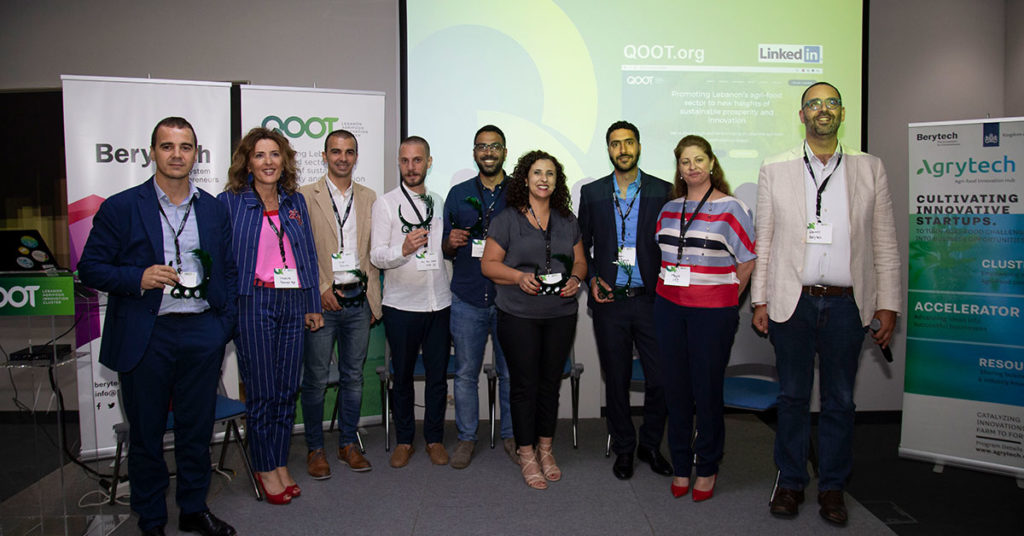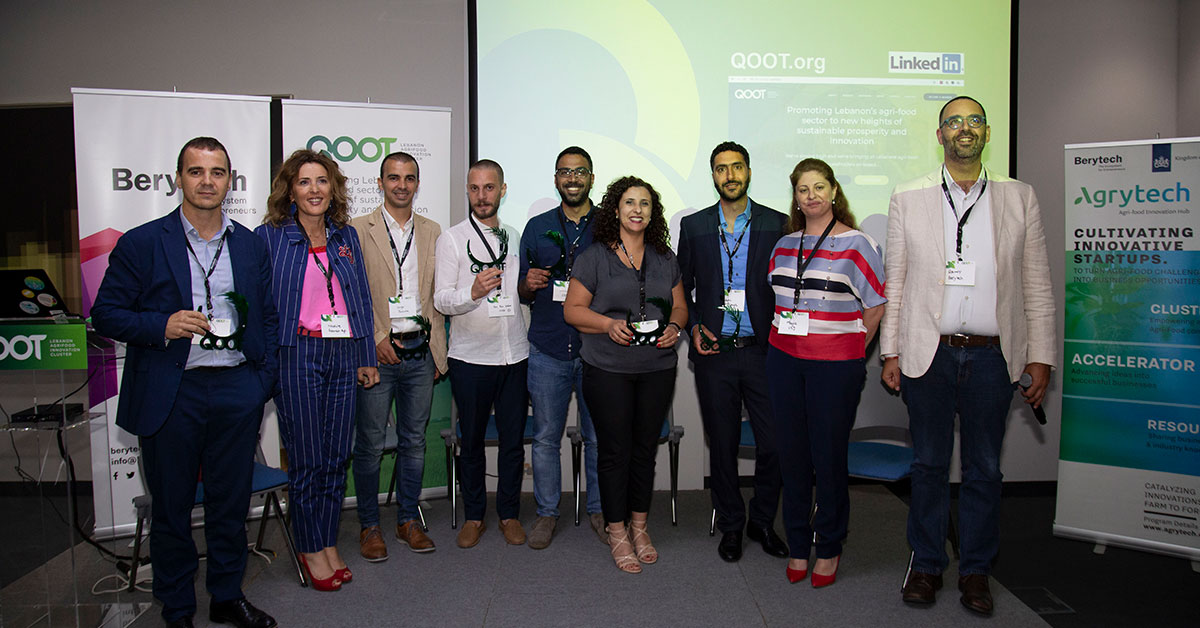During the first Meet and Learn Networking event, Qoot Cluster brought together Lebanese enterprises and SMEs, knowledge providers and support institutions to meet, learn and check opportunities for joint R&D projects.
Last week, more than 60 professionals and institutions joined the first Meet and Learn Networking event organized by Qoot – the Lebanese agri-food Innovation cluster, supported by Berytech and the Kingdom of the Netherlands. The event combined speakers from academics and professionals working on joint R&D projects with companies, allowing the attendees to explore the opportunities present through potential collaboration between universities, academics and public R&D agencies for the development of innovative solutions in the Agri-food sector.
Dr. Maya Kharrat, director of École Supérieure D’ingénieurs D’agronomie Méditerranéenne from University Saint Joseph, Dr. Marc Bou Zeidan and Dr. Emilio Mouannes, respectively positioned as the Head of food Engineering Department and Project international relation coordinator at the Holy Spirit University of Kaslik, along with two international speakers from Spain, Mr. Diego Teruel, Business director at Fundacion Tecnova, and José Manuel Durán Cuevas, Chief Representative of the Spanish Agency of Innovation CDTI for Middle East and North Africa, were invited to talk about the different projects related to R&D their universities have been working on with private companies on one side, and how the private sector is also benefitting from technology transfer.
The attendees had the opportunity to explore potential collaboration and learn about different opportunities for joint R&D projects as well as to find out about funding opportunities for their innovation projects.
Qoot: the agri-food innovation cluster
Ramy Boujawdeh, Berytech’s Deputy General Manager and Agrytech Program Director, welcomed the attendees to the first edition of the Meet & Learn Networking event. He was then joined by Rani Azzi, Qoot Vice president and Vineyard Manager – Assistant Technical Director at Chateau Kefraya, who presented the cluster which is working toward accelerating innovation in the Lebanese Agri-food sector by bringing together innovative companies, knowledge providers, support institutions, and investors working on new agricultural processing techniques, automation, business model concept, new packaging, technology, new product, variety or breed.
The cluster is composed to date of 34 members from which 19 are SMEs and 15 are large companies working on innovations in the agri-food sector.
In light of supporting the members with their business innovation, Qoot Cluster works on the company’ needs, organizing workshops and seminars, linking companies and knowledge institutions. Azzi explained that one of the major aspects to look at was the importance of collaboration between the private sector and the universities. Both can benefit as the companies can share their challenges with the universities so that the students can help, and the universities get the chance to personalize their curriculum to the market needs.
Technological development and innovation through technology transfer
Diego Teruel explained how technology transfer can improve agro-industrial sector between using Fundacion TECNOVA as a case study. Fundación TECNOVA is a technology center for the ancillary industry for agriculture, post-harvest and food production packaging, comprising over 120 companies. TECNOVA has been working in connection with R&D&I, training, company promotion and internationalization, to offer quality services tailored to the needs of the sector whilst always seeking continuous improvement for its companies. They have been on R&D&I projects and technology transfer through providing training plans, prototype design, consultancy and feasibility plans.
As for José Manuel Durán Cuevas, he presented the CDTI program as an opportunity to fund innovative bilateral projects. CDTI fosters the technological development and innovation of Spanish companies. It is the entity that channels the funding and support applications for national and international R&D&I projects of Spanish companies. They aim at increasing the competitiveness of the companies by raising their technological profile based on technological excellence and by easing them to provide innovative solutions to the market.
The two international speakers presented the different opportunities that Lebanese companies can benefit from and the two Lebanese universities working on R&D with the private sector presented how universities and companies can work hand in hand to solve some challenges
From Bench to Business
Dr. Maya Kharrat explained how ESIA-M is linking research through their curriculum. ESIA-M has for mission to contribute to the development of the food value chain sector in Lebanon and the region through education, research and technology transfer. They have been working on applied research with companies working on innovations and solutions, for no fees. Some of their works includes helping private companies with their projects such as Master Chips, Gout Blanc, Ethel Chocolate, Chateau Kefraya, Natagri and Gandour. In addition, ESIA-M is also offering community service through its lab analysis expertise for food analysis, soil and water analysis and fruit and vegetable analysis.
As a great example on how universities can benefit the private sector while benefiting their own students through R&D, Dr. Emilio Mouannes and Dr. Marc Bou Zeidan, talked about the approach of innovation as a tool to bridge the gap between academia and the agri-food Industry. USEK has been working on several challenges such as the development of a processed spreadable goat cheese, implementation of local sourdough in the production of bread, and producing brewers spent grain cereal bars from beer waste.
The speeches ended with a great networking event where different academics, professionals, NGOs and people from the public sector got to meet and discuss potential collaboration for R&D projects.






